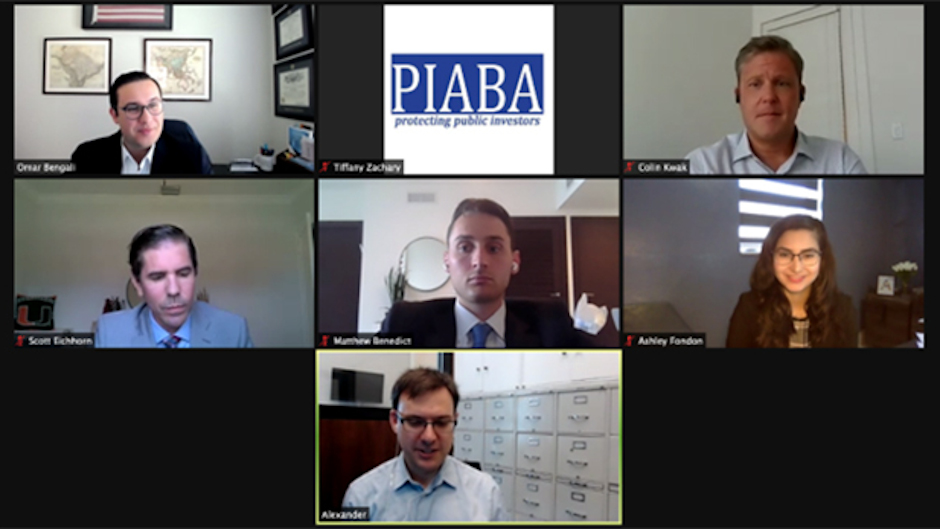In collaboration with the Public Investors Advocate Bar Association, student interns in the summer Investor Rights Clinic met with the staff of U.S. senators and representatives to educate members of Congress on critical issues impacting investors and advocating for legislation for the protection of investors as part of PIABA Hill Month. The annual meetings between investor advocates and congressional staff took place virtually for the first time in 2021.
The focus of the students’ advocacy was the practice of mandatory arbitration in claims for investment losses. Almost all brokerage firms include language in their contracts with customers that require disputes to be resolved by Financial Industry Regulatory Authority arbitration. Many investors are unaware that they cannot bring a claim in court until they consult an attorney after a claim against their broker arises.
Jessica Klayman, 3L, saw a connection between her work in the IRC and the legislative advocacy. “Investor protection can be seriously undermined by the blanket use of boilerplate forced arbitration clauses we saw our clients subjected to,” she said.
The IRC represents investors who cannot obtain legal representation in FINRA arbitration proceedings. Thus, the investor protection concerns raised by mandatory arbitration were particularly relevant to the experience of IRC attorneys, students, and clients.
“An advocator must do more than just explain the issues and ask for support,” said 2L Matthew Benedict. “Rather, the most effective way to stand out is to tell the stories of those affected by the flaws in the system. Working in the University of Miami Investor Rights Clinic over the summer of 2021 provided me an opportunity to get hands-on experience seeing the stories of individuals affected by FINRA arbitration.”
In June 2021, after students of the IRC learned the basics of mandatory FINRA arbitration in IRC seminars, they studied talking points and prepared with attorneys from across the nation. They took active roles in the meetings with congressional staff, gaining perspective on the process of advocating for interests to lawmakers.
“By understanding the process of advocacy for legislative change, we were better able to argue why the senators ought to support investors. It is because we understood the challenges that the investors faced due to the shortcomings in existing law,” 2L Lauren Assayag said. “By understanding where existing law fell short, we proposed changes to remedy these shortcomings.”
Why is mandatory arbitration an issue of concern for investor advocates?
Investors subject to forced arbitration lose their Seventh Amendment right to trial by jury and have their claims determined by arbitrators who are not judges and not bound to follow the law. Because almost all investor claims against brokers have been decided through arbitration for more than 30 years, case law relating to these claims is scant. Almost all FINRA arbitration decisions do not include reasoning or represent a binding precedent for future cases.
In addition, as explained by Assayag, “Investors are deprived of abilities to appeal, and there is little transparency in the process because written decisions are not required, and arbitration is a private process.”
Other concerns for investors specific to FINRA arbitration include that the same self-regulatory organization that governs the industry — FINRA — also administers the arbitration forum. And as FINRA makes efforts to increase the diversity of its pool of arbitrators, the lack of diversity among arbitrators remains a concern.
“For instance, when selecting arbitrators from the arbitration pool [in a clinic case], there were a disproportionate number of males, and the average age was 70,” said Lauren Assayag, 2L.
Moreover, one study has suggested that outcomes of FINRA arbitrations show FINRA arbitrators’ inherent bias toward industry parties, and the arbitrator selection process suffers from “repeat player” bias, in that brokerage firms are regular parties to FINRA arbitrations and strike arbitrators that have a record of awards in favor of customers. It creates an incentive among arbitrators to align decisions more closely with industry interests.
“Investors subject to arbitration clauses give up their right to trial by jury, and arbitrators may hold investors to unrealistic expectations, given their investment knowledge and background,” said Assayag.
What is the solution to the investor protection concerns with mandatory arbitration?
One possibility is the Investor Choice Act of 2021, which would amend federal securities laws to allow investors to choose whether to resolve disputes with their brokers in arbitration or state or federal courts. Although bills have been introduced in the House of Representatives and the Senate, neither bill has a Republican co-sponsor, and both have been referred to congressional committees. Students of the Investor Rights Clinic advocated support of the Investor Choice Act of 2021 to the aides of senators and representatives with whom they met.
Another possibility is action by the Securities and Exchange Commission.
“In addition to supporting the Investor Choice Act, we asked lawmakers to use oversight of the SEC to encourage the agency to adopt rules that would impose limits or eliminate forced arbitration,” said Assayag.
The SEC has authority under the Dodd-Frank Act to impose restrictions or prohibitions on mandatory arbitration provisions in brokerage firms’ customer agreements if the SEC finds that such restrictions or prohibitions are in the public interest and for the protection of investors. Students of the Investor Rights Clinic advocated that senators and representatives support SEC initiatives to conduct a study to determine whether to use its power to restrict or prohibit mandatory arbitration provisions.
Over a week in June 2021, the Investor Rights Clinic student interns met with staff from the offices of Sen. Marco Rubio (R-FL), Sen. Jeanne Shaheen (D-NH), Rep. Donald Norcross (D-NJ), Rep. Patrick T. McHenry (R-NC), Rep. Tom Suozzi (D-NY), Rep. Greg Steube (R-FL), and Rep. Tod Deutch (D-FL).
“Ultimately, the process of advocacy is an uphill battle,” said Benedict, “but being able to convey the issues through real-world stories has a lasting impact.”
Read more about Miami Law’s Investor Rights Clinic.

